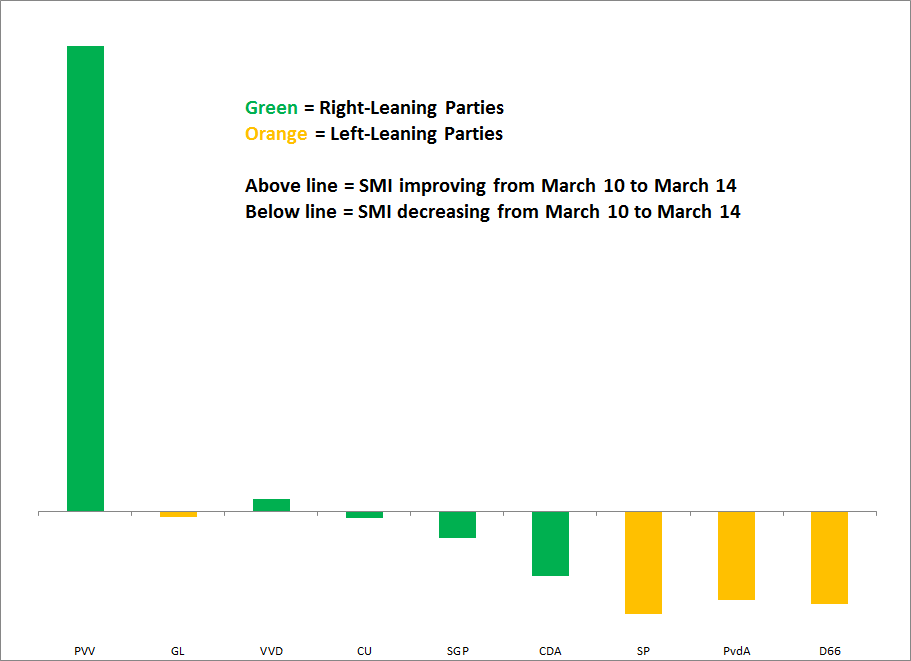Dutch Election Late Surge for Populists but Left-Leaning Parties still Win Out
The SMI has fairly consistently pointed towards right-leaning parties underperforming polls in the 2017 Dutch Election. This forecast, however, has been impacted by real world events that have greatly helped the Social Media Influence (SMI) ratings of right-leaning parties, principally the populist PVV. SMI forecasts currently have right-leaning parties, as a group, still underperforming the latest poll but place them in a much better position than just one week ago. D66 and GL, two of the main left-leaning parties, are still forecast to positively surprise in the election which should be the main headline once votes are counted.
Before getting into forecasts, it should be highlighted that SMI ratings leverage the fact that social media reflects society’s mood in real-time. SMI analysis in the current contentious global political environment has been superior to traditional forms of political analysis that are much more open to bias. SMI analysis however does have weaknesses – one of which is that it is very sensitive to unexpected real world events as people tend to rush to social media and express their opinions. This is a weakness in that it can exaggerate moves, but can also be seen as an advantage as it picks up on trends very quickly.
For the Dutch election, a highly unusual series of events occurred over the last week, but really came to a head over the weekend. These events culminated in rather dramatic diplomatic posturing between the Netherlands and Turkey which also included Turkish immigrants in the Netherlands rioting and Dutch riot police arresting at least 12 people. Additionally, Turkey’s President denounced the Netherlands as a ‘Nazi remnant’ which of course did not really help matters.
These scenes as they played out fell more or less along the narrative of the PVV (populist party) which regularly paints immigrants as not assimilating into Dutch society. The fact that Turkish immigrants and the Turkish government were so forceful appears to have boosted conservative positions. The PVV has benefited disproportionately from these rather abrupt events.
Chart 1: SMI Rating Change for Main Political Parties from March 10, 2017 to March 14, 2017
Source: ZettaCap
The previous chart shows just how important these events have been in impacting SMI ratings. The SMI rating of PVV has exploded. The only other party which experienced a SMI rating increase was the GL, or Green Party, which is led by Jesse Klaver whose father is of Moroccan descent. The VVD, the current party of power, which created a strong stance against Turkey, remained basically flat.
Interpreting the rapidly shifting SMIs is rather straight-forward. PVV, as the party generally seen as being hardest on immigrants, saw a huge bump in its SMI partially due to scenes of immigrants waving Turkish flags and rioting in the streets of Rotterdam. The VVD, as the party which implemented a harder stance, basically remained flat. And, GL, being led by an individual with a foreign-born parent, has apparently received a small boost from those supporting immigrant rights.
In relative terms, right-leaning parties as a group benefited and left-leaning parties deteriorated in terms of SMI.
Prior to these events, at the end of last week, SMI ratings appeared fairly stable. D66 looked to win the most seats in the election, followed by VVD and GL with PVV in fourth place. Such results would have gone very much against betting market and political pundit expectations as we laid out here.
These recent events have provided right-leaning parties and specifically the PVV a good amount of momentum. The fact that such dramatic and unexpected events occurred within a week of the election provides a difficult problem for SMI forecasts. In its purest interpretation, a spike in influence would result in a spike in electoral support. However, under normal circumstances such spikes would be tempered by longer term trends and, ideally, would not happen days before an election. This, frankly, creates a test for the SMI forecasting system that it has yet to face.
Taking the shorter term interpretation (taking SMI ratings at face value) shows that PVV will win the election by a fair margin with D66, VVD and GL (in that order) finishing in a cluster or fairly close together. This scenario would have PVV, D66, and GL outperforming the latest March 14, 2017 Peil poll and VVD underperforming.
Taking a longer term interpretation (using smoothed SMI data to lessen the impact of the weekend’s events) shows that D66 will win the election. GL, VVD and PVV, in that order, win descending number of seats. In this scenario, the left-leaning parties of D66 and GL greatly outperform polls while VVD and PVV greatly underperform polls.
In either of these main scenarios, right-leaning parties in aggregate do not outperform polls. Even in the more advantageous case of taking SMI ratings at face value and not applying any smoothing, right-leaning parties as a group still underperform poll forecasts. In other words, even though PVV by itself would outperform in this scenario, right-leaning parties as a group would not.
Table 1: Number of Seats in Dutch Parliament, Comparison of Last Election (actual number of seats), Latest Poll (expected seats), Short-Term Social Media Influence (forecasted seats), and Long-Term Social Media Influence (forecasted seats)
|
Last Election |
Last Poll | ST SMI |
LT SMI |
|
| Right-Leaning |
74 |
78 | 71 |
56 |
| Left-Leaning |
72 |
58 | 71 |
81 |
| Small Parties |
4 |
14 | 8 |
13 |
|
Total Number of Seats |
150 | 150 | 150 |
150 |
Source: Wikipedia, Peil Poll, and ZettaCap, ‘Right-Leaning’ includes PVV, VVD, CDA, and CU, ‘Left-Leaning’ includes D66, GL, PvdA, SP, and SGP.
As the previous table shows, even using the short-term SMI data that more fully incorporates the late positive surge for the PVV, right-leaning parties are still expected to underperform polls. Using longer term or smoothed SMI data, the results forecasted by the latest poll (March 14, 2017) and LT SMI are almost inverse of one another.
In any of the SMI generated forecasts, right-leaning parties as a group are expected to underperform polls. This will be a ‘shock’ to the media who have built up the PVV and its leader Wilders as well as the threat of right-leaning policies taking over Europe.
Additionally, in a bizarre twist, the PVV winning a greater number of seats will hurt right-leaning policies more than if it did not. It turns out that not even the center-right VVD wants to form a coalition with the PVV. So, unless the PVV can establish an outright majority, it looks like they will become isolated in parliament. An increased influence of left policies is almost certain under these conditions.
As for verifying forecasts, the weekend’s events have blurred the lines a bit as it really depends on the interpretation of exogenous events so close to election-day. Plus, using forecast scenarios can be confusing for those not accustomed to making forecasts. In short, you will know if the SMI did a good job if left-leaning parties, specifically D66, outperform. You will know if SMI did a poor job if you see right-leaning parties win considerably more seats than left-leaning ones.
Note that according to PredictIt, a betting site, right-leaning parties are expected to win decisively. The chances of the following parties winning the most seats in parliament according to PredictIt, today, the day before voting, are VVD at 59%, PVV at 44%, CDA at 4%, and all other listed parties at 1%. Only right-leaning parties have a probability of winning, according to the betting markets, that is over 1%. Essentially, calling for left-leaning parties to outperform, which the SMI does, and perhaps win the most seats is considered extremely unlikely by the ‘markets’.
Media articles written after the election will, according to SMI forecasts and our interpretation of the environment, include some of the following themes:
- PVV and Wilders underperformed, is this the end for him and his movement,
- PVV dwindling influence and its isolation in parliament,
- Disappointing performance of Dutch populists diminishes potential of other European populists,
- D66, the new power broker in Dutch politics,
- The new coalition government in the Netherlands will be / is ‘surprisingly’ liberal,
- Green Parties surging in Europe, after the GL outperforms in the Netherlands and a former Green party member won in Austria,
- Jesse Klaver is the new Obama or Kennedy.
These forecasts imply gains for pro-European Union and pro-globalization themes, which will be welcomed with a sigh of relief by the financial markets. The Euro, which has been in a bear market for years, will benefit on the election results – that is, assuming the SMI forecasts are correct. In fact, as the market extends these issues to upcoming elections in France and Germany, the Euro has the potential to snap its multi-year losing streak and appreciate for the coming years as it becomes apparent that at least the core of the Eurozone will remain intact and engaged. Yields will also contract, such as in France, as risk of a populist wave taking over Europe is seen to subside with the PVV’s underperformance and /or isolation.
Lastly, it should be highlighted that these forecasts are not politically motivated. The conclusions are very left-leaning in the Netherlands, that is for sure. But there is no political bias in the interpretation of the data. We look purely at the data in an objective fashion with the goal of establishing social media analysis and alternative data analysis as serious tools for forecasting. Also note that SMI forecasts were the only one to correctly forecast Trump winning the 2016 US Presidential Election with 306 (the correct number of) electoral votes. In other words, we make forecasts based on data and established algorithms not political bias. In fact, one of the prime reasons we believe that polls and political pundit analysis are dated in the current global environment is that they are more open to bias and misrepresentation of facts.

